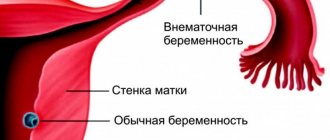Why does my stomach hurt but I don’t have my period? There can be many reasons. This article addresses the most common problems.
Pregnancy
If your stomach hurts and you don’t have your period, the first thing that comes to mind is a possible pregnancy. If such suspicions exist, then you should buy a test and go to a gynecologist for a consultation.
Ovulation
Some girls experience pain in the lower abdomen during ovulation. This does not always mean that the woman is unhealthy. Simply due to some characteristics of the body, ovulation is accompanied by pain. Such sensations arise due to rupture of the follicle. This is a normal phenomenon and there is no need to be alarmed.
Gynecological problems
If the stomach hurts, but there are no periods, then it is likely that the girl suffers from gynecological diseases. For example, inflammatory processes occur. Many girls do not pay attention to this, but only think about it when severe pain begins. But in this case it is necessary to undergo treatment. Inflammatory processes eventually develop into more serious diseases. The fact is that if left untreated, liquid accumulates in the pipes. Therefore, very often the stomach hurts, but there is no period. Further, when a girl wants to get pregnant, she will not be able to, because the tubes will be impassable. And it is not a fact that such a disease can be cured. Therefore, it is extremely important to diagnose the disease in time and begin therapy.
Acyclic pain
From the name it is clear that the cycle does not affect pain. They are not temporary, but permanent. Most often they occur due to urolithiasis. Therefore, it is necessary to visit a therapist. Pain also occurs due to endometriosis. In this case, the main thing is to diagnose the problem in time. Adhesions can cause sharp and severe pain. Problems also arise due to cystitis, colitis and osteoarthritis. In addition, pain can also indicate the presence of fibroids, and the breasts also become engorged. It is important to visit a doctor in a timely manner; if the patient delays the visit, she may remain infertile.
Ectopic pregnancy
The reason why the stomach hurts, but there are no periods, may also be that the woman is developing an ectopic pregnancy. In this case, you need to monitor your condition very carefully. If a girl feels nauseous and dizzy, it is important to consult a doctor immediately. Otherwise, the tube may rupture and cause bleeding. In this case, surgical intervention cannot be avoided.
Delayed menstruation and stomach pain
As mentioned above, pregnancy may be the cause. And not necessarily ectopic. If your suspicions are confirmed, you should consult a doctor. The cause of pain may be the tone of the uterus. This is a threat of termination of pregnancy. But don’t worry too much, the gynecologist will prescribe medications and the pain will stop.
Stomach hurts, period is a week away
If your stomach hurts a week before your period, it is most likely ovulation. Perhaps it's late. But in any case, there is no need to worry too much. So-called “ovulatory pain” occurs monthly in approximately five percent of women.
If a woman is 5 days late, she begins to worry. And of course, the first thing that comes to mind is pregnancy. The woman immediately buys a test to check this. But the reason for a missed period is not always pregnancy. Sometimes it happens that the test shows a negative result. “What is the reason for the delay then?” - the woman asks. And there can be many reasons. But don’t immediately panic that you are sick. Maybe it's not so bad. Not all women know their body and how it works. First, let’s find out what the menstrual cycle is.
Pain in the abdomen when menstruation is delayed, reasons why the lower abdomen hurts when menstruation is delayed
Women have become increasingly concerned about problems associated with delayed menstruation and resulting abdominal pain. Gynecologists believe that the problems listed above largely depend on the deterioration of the surrounding ecosystem. There is active pollution in the world around us, and this cannot but negatively affect the health of a modern woman. Poor nutrition, smoking, drinking alcohol and the current environment cause abdominal pain during a delay in menstruation. That is why cases have become more frequent when women actively visit a gynecologist on issues related to problems with delay or absence of menstruation.
What to do if there is severe pain in the lower abdomen when menstruation is delayed?
First you will need to determine whether pregnancy is occurring. In this case, severe pain that occurs in the abdomen during pregnancy may indicate the detection of some pathology, as well as the appearance of an ectopic pregnancy and other problems. But more often, these signs still confirm the presence of pregnancy. To determine a possible pregnancy, tests are used, which are available in many pharmacies today. What to do when your stomach hurts, your period is delayed, and the test gives a negative result? Such symptoms should cause a woman particular concern. Therefore, it is recommended to consult a gynecologist to prevent the cause of delayed menstruation and abdominal pain.
When is a delay in menstruation normal?
Puberty and the ovulatory cycle
The gradual puberty of girls leads to the appearance of their first menstruation - menarche, usually at the age of 12-13 years. However, during adolescence, the reproductive system is not yet fully formed. Therefore, disruptions in the menstrual cycle are possible. Delayed menstruation in adolescents occurs during the first 2 years after menarche; after this period, it can serve as a sign of disease. If your period does not appear before the age of 15, this is a reason to visit a gynecologist. If an irregular cycle is accompanied by obesity, excess body hair growth, voice changes, as well as heavy menstruation, it is necessary to seek medical help earlier in order to begin correcting the disorders in time.
Normally, by the age of 15, the cycle is already regular. Subsequently, menstruation occurs under the influence of cyclical changes in the concentration of hormones in the body. In the first half of the cycle, under the influence of estrogens produced by the ovaries, an egg begins to mature in one of them. Then the vesicle (follicle) in which it developed bursts, and the egg ends up in the abdominal cavity - ovulation occurs. During ovulation, short-term mucous white discharge appears from the genital tract, and there may be a slight pain on the left or right side of the lower abdomen.
The egg is captured by the fallopian tubes and travels through them to the uterus. At this time, the burst follicle is replaced by the so-called corpus luteum - a formation that synthesizes progesterone. Under the influence of this hormone, the layer lining the inside of the uterus - the endometrium - grows and prepares to receive the embryo when pregnancy occurs. If conception does not occur, progesterone production decreases and the endometrium is rejected - menstruation begins.
During fertilization and development of the embryo, the corpus luteum in the ovary continues to actively produce progesterone, under the influence of which the implantation of the egg, the formation of the placenta and the development of pregnancy occur. The endometrium does not undergo degradation and therefore is not rejected. In addition, progesterone suppresses the maturation of new eggs, so there is no ovulation and, accordingly, cyclic processes in the woman’s body stop.
If there is a delay
If menstruation is delayed by 3 days (and often on the first day), you can do a test at home to determine pregnancy. If it is negative, but the woman is still concerned about the delay, she should undergo an ultrasound examination of the uterus using a vaginal probe, as well as a blood test that determines the level of human chorionic gonadotropin (hCG).
If the second phase of the cycle is determined, then menstruation will come soon; if there are no signs of the second phase, you need to think about ovarian dysfunction (we’ll talk about it below); during pregnancy, a fertilized egg is detected in the uterus, and during pregnancy it is located, for example, in the fallopian tube (). In doubtful cases, the hCG test can be repeated after 2 days. An increase in its concentration by two or more times indicates the progress of intrauterine pregnancy.
Menstruation after childbirth
After childbirth, the menstrual cycle for many women does not immediately return, especially if the mother feeds the baby with her milk. Milk production occurs under the influence of the hormone prolactin, which simultaneously inhibits the synthesis of progesterone and ovulation. As a result, the egg does not mature, and the endometrium does not prepare to receive it, and then is not rejected.
Usually, menstruation is restored within 8-12 months after childbirth while breastfeeding the baby and the gradual introduction of complementary foods. A delay in menstruation during breastfeeding with a restored cycle in the first 2-3 months is usually the norm, and in the future it may indicate a new pregnancy.
Declining reproductive function
Finally, over time, women's reproductive function gradually begins to fade. At the age of 45-50 years, delays in menstruation, irregular cycles, and changes in the duration of discharge are normally possible. However, even at this time, ovulation is quite likely in some cycles, so if menstruation is delayed for more than 3-5 days, a woman needs to think about pregnancy. To exclude this possibility, you should consult a gynecologist in time and select contraceptives.
What could be the reasons for a missed period?
The main reasons for the delay in the onset of menstruation in women include not only poor nutrition and the influence of negative environmental influences, but also frequent nervous disorders and various stresses. Eating fatty and very spicy foods, including smoked, salted, and overcooked foods in the diet leads to severe weakening of the body. All this negatively affects the regularity of the menstrual cycle. It goes without saying that a weakened female body has special difficulty in controlling the processes of timely appearance and painless passage of discharge.
Can there be pregnancy if there is no menstruation and pain in the lower abdomen?
Pregnancy, in the early stages of its manifestation, involves the appearance of mild pain in the lower abdomen, which women most often characterize not as mild pain in the groin or ordinary discomfort in this area. But, on the other hand, such pain in the lower abdomen during pregnancy may indicate the appearance of certain diseases. The main thing in such situations is not to ignore the appearance of severe abdominal pain. You should immediately purchase it at the pharmacy and take a pregnancy test. And in order for a future pregnancy to proceed without complications and the danger of its termination, you need to visit an antenatal clinic, be examined and receive specific recommendations from a doctor. Only a safe and calm pregnancy should not cause a woman discomfort in the lower abdomen. But occasional mild nausea is not a sign of concern.
When the test is negative during pregnancy
For a woman, the issue of establishing pregnancy as early as possible is very relevant, so she tracks her menstrual cycle, notes the date of ovulation, so that there are no unnecessary problems later. You can suspect conception based on the following basic signs:
- delay of menstruation;
- nagging pain in the lower abdomen, radiating to the lower back;
- frequent urge to urinate;
- breast enlargement and tenderness;
- mood swings, changes in food preferences;
- nausea, sometimes vomiting, especially in the morning or after eating.
Noticing similar symptoms, our lady does testing to reassure herself. The principle of operation of all tests is to determine the level of hCG in the urine.
Hypersensitive ones respond to 10 mIU/ml, they are done even before the delay, and ordinary ones - to 20-25 mIU/ml, they are carried out from the first day of absence of critical days.
Defective pregnancy test
If you feel sick for a week and the test is negative, then the delay may be caused by conception, in the absence of other symptoms. It all depends on when you did your first analytics. Perhaps the testing on the first day of the delay was carried out in violation of the instructions, or you used products that had expired.
Therefore, after 5-7 days you need to repeat the procedure. If you receive the same result, you need to visit a therapist and try to figure out what caused such a deviation.
It happens that to the question why, when your period is late, you feel sick and the test is negative, the answer lies in the test itself, it may be defective or expired, in this case it is recommended to buy a new one for re-checking
Carrying out an ultrasound
In the case where you feel sick, the delay is 2 days, the test is negative, again, fertilization cannot be ruled out; this issue can be settled with certainty only after a repeat analysis, a visit to the gynecologist and an ultrasound.
Perhaps you ovulated late and conceived just before your period, it is clear that the test reagent cannot detect too low levels of hCG in the urine. Or maybe a low pregnancy hormone is caused by a threat of miscarriage or the fertilized egg has stopped developing.
Ectopic pregnancy
If, with obvious signs of fertilization and a delay of 4 days, the test is negative, you feel sick, and you also have a dull nagging pain in the lower abdomen, dizziness, brown vaginal discharge, most likely you have an ectopic pregnancy. With it, the hCG level is below normal and does not increase, as with normal conception, so testing does not indicate pregnancy. In this case, you should immediately contact a gynecologist for an ultrasound scan, and if the diagnosis is confirmed, then you cannot do without surgery.
Sometimes a psychological pregnancy occurs, that is, a false one. Here the woman is so concerned about the birth of the baby that she makes the body believe it. She finds all the signs of an “interesting situation”, her breasts are enlarged, she feels nauseous, the delay is 5 days, but the test is negative, since the desire of the expectant mother is not enough, and the reagent of the test strip cannot be fooled.
Amenorrhea and lower abdominal pain
With prolonged delays of menstruation, from several months or even up to six months, if they are accompanied by pain and periodically recurring symptoms of premenstrual syndrome, doctors diagnose amenorrhea. This is a very serious disease and is caused by a malfunction of the entire female body. In such cases, abdominal pain should only be treated by a gynecologist. Once the diagnosis of amenorrhea is fully clarified and confirmed, hormonal medications are usually prescribed. Their admission is carried out only under supervision, and visits to the hospital are mandatory. If the test result is positive and confirms pregnancy, and the patient has pain in the lower abdomen, if there is a slight delay, she should immediately see a specialist.
Ovarian dysfunction and retention
A 5-day delay in menstruation should alert you. Especially if this happens for the first time. Nowadays, there are many women diagnosed with ovarian dysfunction. This diagnosis is not scary at all. It only explains why your period is late. It is very important to find the reason why the dysfunction occurred. Based on this, you may be prescribed a course of hormonal medications, and with their help your cycle will be restored. In order to prescribe treatment for you, some tests will need to be done to understand the cause. Usually, with such a picture, a blood test is prescribed, including hCG and ultrasound. This is to determine if you are pregnant. It often happens that ovarian dysfunction occurs due to stress.
But the most common reason for this is inflammation. It can begin due to various factors: poor hygiene, chlamydia, candidiasis, and other sexually transmitted infections. Therefore, it is very important to pass all the necessary tests and consult with a gynecologist.
Treatment of abdominal pain with delayed menstruation, what to do, how to treat?
You should consult a specialist about the occurrence of pain in the lower abdomen when menstruation is delayed. Such problems turn out to be consequences of emerging diseases and various pathologies. If they are neglected, this will lead to serious complications and long-term treatment. At the same time, one cannot ignore and allow the appearance of temperature, fever, intensification and attacks of pain. You should not endure such pain. You need to urgently contact specialists. The faster women do this, the faster relief and recovery will come.
Even before visiting a specialist, you should independently analyze and determine the possible causes of painful symptoms. First, you need to remember when your last period was and how it went. Then calculate the number of days of delay and take a pregnancy test yourself. You need to carefully consider whether during this period there were any strong emotional and stressful situations, prolonged depression, or taking any antidepressants or other medications. To confirm the fact of pregnancy if your period is delayed by three or more days, you need to use a possible pregnancy test. To confirm it, you should repeat the pregnancy test after one or two days. Worrying pain in the lower abdomen when menstruation is delayed is a reason for an urgent visit to a gynecologist. Self-medication can lead to dangerous and irreversible health consequences, and to avoid them, contact a specialist in time.
Causes of menstrual cycle disruption
A delay of 5 days often occurs in overweight women. If you think you weigh too much, you can try checking it yourself. There is a special formula for calculating body mass index.
The number of your kilograms must be divided twice by your height in meters. If the resulting number is greater than 25, then you are overweight, so your period does not come. However, a value of 18 should also be a concern because it is too low a weight. If the reason is precisely the number of kilograms, achieve a weight in the range from 18 to 25 and menstruation will be restored.
Due to excess weight
The reasons for a delay of about 5 days in menstruation are sometimes due to overwork. Today it is especially difficult to avoid this. Stress, lack of sleep, problems and quarrels often affect menstruation. Menstruation failure occurs in athletes who train too hard. When overexerted due to sports activities, a woman’s body begins to produce male hormones and problems with the cycle occur.
Also, failures sometimes occur due to climate change. This is especially true during the holidays. Therefore, if after a vacation in a hot country you had a delay of about 5 days, and then your period still came, this is the reason. The body simply does not have time to rebuild.
Medical causes and pathologies
A delay in the onset of menstruation by approximately 5 days may occur due to medical reasons. There are several of them.
- Ovarian dysfunction.
- Polycystic disease.
- Inflammatory diseases.
If you experience a delay of 5 days or more for the first time, you should consult a doctor. He will conduct tests and make an accurate diagnosis. Today in the world there are a large number of women suffering from ovarian dysfunction. This is not a fatal disease, but it is extremely important to determine the reason why the pathology developed.
Based on this reason, the doctor prescribes a course of hormonal medications to restore the cycle. Most likely, on the 5th day of the delay you will have to take hCG, a blood test, and undergo an ultrasound. Sometimes dysfunction occurs due to stress.
Donating blood for hCG
Inflammation is the most common cause of a 5-day delay in menstruation. It appears due to various factors: poor hygiene, candidiasis, chlamydia and other STDs. If you are sexually active, it is very important to get tested regularly to detect possible infection in a timely manner. Then you won’t have to decide what to do if a delay of 5 days occurred precisely because of this.
Today, many women suffer from polycystic ovary syndrome. This is a serious pathology that causes dysfunction of the ovary and hormonal imbalances. The pancreas and adrenal glands also suffer. Sometimes the diagnosis becomes clear just by looking at women suffering from regular cycle disorders. They usually have a lot of body hair and are overweight. However, sometimes these factors are missing.
The pathology is dangerous due to the possibility of developing infertility. It can be very difficult for girls to get pregnant, so they definitely need to take hormones. If the pathology progresses, surgery may be required. It is better not to delay going to the doctor. After completing the course of treatment, the cycle is restored.









